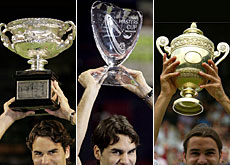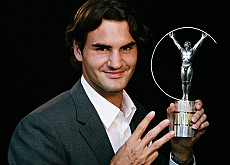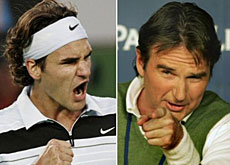“Records are made to be broken”

It took him six years to get from love to 15, but in surpassing Pete Sampras's record 14 grand slam titles, Roger Federer is now officially the greatest tennis player of all time.
Of course, one can argue about the futility of comparing Federer with, say, a wooden-racket wielding Laver, but in the modern-era the statistics – and slow-motion replays – speak for themselves.
“Almost anyone who loves tennis and follows the men’s tour on television has, over the past few years, had what might be termed ‘Federer Moments’,” wrote David Foster Wallace in the New York Times.
“These are times, as you watch the young Swiss play, when the jaw drops and eyes protrude and sounds are made that bring spouses in from other rooms to see if you’re OK.”
There are plenty of these moments to choose from: there was the outrageous backhand winner against Rafael Nadal to save matchpoint in the 2008 Wimbledon final (admittedly in vain).
Or more recently, what has been dubbed by many the “shot of the century”: the between-the-legs, back-to-the-net, crosscourt winner from behind the baseline against Novak Djokovic to give Federer matchpoint in the US Open 2009 semifinal. To see that shot, click on the “magic shot” link to the right.
While Sampras’s achievements are undeniable, few people found themselves having “Sampras Moments”.
Sampras himself has said: “I think [Federer] can and will break every tennis record out there.”
Homework
It does indeed seem that Federer breaks a milestone every time he steps on court. The 2009 Wimbledon final against Andy Roddick was no different, and not merely because they played a 16-14 fifth set and 77 games in total – records for any grand slam championship match until the extraordinary match at Wimbledon in 2010 when John Isner defeated Nicolas Mahut 6-4, 3-6, 6-7, 7-6, 70-68.
Federer’s victory gave him 15 grand slam titles, one more than the career mark he shared with Sampras. It came in Federer’s seventh consecutive title match at the All England Club and 20th major final, two more records. It gave him six Wimbledon championships, one short of the record. It returned him to number one in the rankings.
“It can freak you out,” Federer said the following day. “It’s a test and that’s why I like to go over these records. You read them quickly for a few minutes, and then you know.”
Federer finds out about the various important matters – history-making matters – at stake heading into a particular match. He does this homework, absorbs it, then does his best to put it out of his mind when the ball is in play.
“You think about it for the rest of the day. But then the shock’s gone, at least,” he explained. “And then, maybe the next day, when the match comes around, you’re all right, focusing again on forehands and backhands and serves.”
He’ll make passing references to his various achievements, pointing out before the 2009 Wimbledon final, for example, that it would be his sixth consecutive grand slam final or noting that he’s participated in 16 of the past 17 grand slam finals.
To some, that might seem arrogant. But it isn’t if you can back it up. And that’s what Federer keeps doing – at a remarkable rate: Sampras’s 14 majors were won over a span of 12 years; Federer’s 17 have taken nine years.
Holy grail
Off court, Federer has won countless awards, including the Laureus World Sportsman of the Year four times (2005-2008) – something no other athlete has ever managed.
In May 2007 he was named one of Time magazine’s 100 “most influential” people in the world.
But it is achieving the Grand Slam, the holy grail of tennis, that would seal Federer’s claim to greatness. The last time a man managed this was more than 40 years ago (see box).
To win the Grand Slam, however, he will have to win the French Open on the clay courts of Roland Garros in addition to the Australian Open, Wimbledon and the US Open – all in the same year.
“It ain’t gonna be easy,” legendary coach Nick Bollettieri told swissinfo (listen to the audio). And indeed it wasn’t. Federer was beaten by Nadal in three consecutive finals in Paris before finally beating Robin Söderling, responsible for a shock defeat of Nadal in the fourth round, in the 2009 final.
Recordbreaker
While the “true” Grand Slam is still a work in progress, Federer already has a litany of other tennis records under his belt (see link).
But he’s going to have to wait to beat Guillermo Vilas’s 30-year-old record of 47 wins in a row.
“Records are meant to be broken – but if I don’t, it’s all right. I’ll start all over again,” Federer said before jinxing himself and losing to Guillermo Cañas at the Indian Wells Masters in March 2007. Federer hadn’t lost since falling to Andy Murray in August 2006 – 42 games previously.
A couple of weeks earlier Federer beat the record for the longest unbroken reign as world number one, overtaking Jimmy Connors’s 30-year-old milestone of 160 weeks. When Nadal usurped Federer on August 18, 2008, Federer had been in pole position for 237 weeks.
“It is a nice record to have. It’s not something you do overnight,” he said. “It’s very hard to beat.”
Federer regained the top spot on July 6, 2009, but he was overtaken in the rankings again by Nadal after the 2010 French Open. Nadal won his fifth title at Roland Garros, while Federer lost in the quarterfinals. That left him one week shy of equalling Pete Sampras’s career record of 286 total weeks at the top. Federer eventually regained the top spot after winning Wimbledon in 2012, thus equalling and then overtaking Sampras.
Unbeatable?
Andy Murray said that to beat him “you have to believe you can win the match. A lot of players don’t believe they can”.
Roddick believes he can – but only with a bit of help: “Maybe we need to do just a tag team effort or something, join forces – like Power Rangers or something.”
And Rod Laver, considered the greatest player of his era, reckons the best way to beat him “would be to hit him over the head with a racket”.
Federer however remains modest. “You’ll never catch me saying ‘I’m the best of all time’. I’ve got too much respect for the history of the sport.”
Although asked after his victory in Paris whether it was easy living as a god, he replied with a grin: “Yeah, it’s fine. It’s not that different from life for you mortals…”
A player who holds all four grand slam titles – the Australian Open, the French Open, Wimbledon and the US Open – at the same time is said to have achieved the Grand Slam. A “true” Grand Slam is when all titles are won in the same calendar year.
Rod Laver is the only male player in the professional “open era” (post-1968) to achieve a Grand Slam (which was also “true”), in 1969. Roger Federer and Andre Agassi have won all four titles but in different years (a career Grand Slam).
Grand slam titles (open era):
17: Roger Federer
14: Pete Sampras
11: Björn Borg, Rafael Nadal
8: Andre Agassi, Jimmy Connors, Ivan Lendl
Comparing incomparables rarely gets very far – who’s better: Pelé or Maradona? Fangio or Schumacher? Thin Elvis or fat Elvis? – and advances in technology make comparisons in tennis particularly futile, but that hasn’t stopped most top players chipping in:
“He’s the most gifted player I’ve ever seen in my life and I’ve seen a lot of people play. I’ve seen the Lavers, I played against some of the great players – the Samprases, Beckers, Connors, Borgs, you name it. This guy could be the greatest of all time.”
John McEnroe
“We have a guy from Switzerland who is just playing the game a way I haven’t seen anyone – and I mean anyone – play before. He is the kind of guy who can overtake the greatest.”
Boris Becker
“He’s the best I’ve ever played against. There’s nowhere to go. Anything you try to do, he potentially has an answer for.”
Andre Agassi
“[In the modern game], you’re either a clay court specialist, a grass court specialist or a hard court specialist – or you’re Roger Federer.”
Jimmy Connors
“Federer is the best player in history. No other player has ever had such quality.”
Rafael Nadal
“I would be honoured to even be compared to Roger. He is such an unbelievable talent and capable of anything. Roger could be the greatest tennis player of all time.”
Rod Laver

In compliance with the JTI standards
More: SWI swissinfo.ch certified by the Journalism Trust Initiative




You can find an overview of ongoing debates with our journalists here. Please join us!
If you want to start a conversation about a topic raised in this article or want to report factual errors, email us at english@swissinfo.ch.